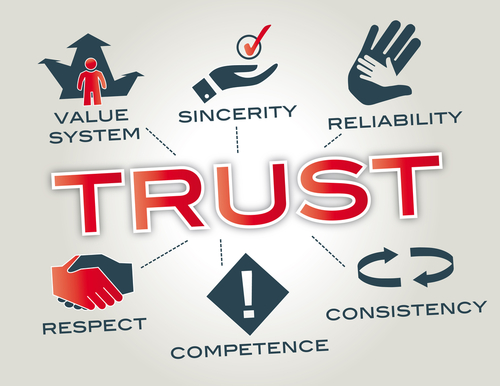- in Blog , Human Resources , Research by David Wilkinson
- |
- 6 comments
Developing trust in the workplace and the role of HR – a new study

Developing trust in the workplace is a key organisational predictor of performance. Many organisations have stumbled and even failed outright where a lack of trust, doubt and suspicion have grown between the leadership, management and employees. Previous studies have found that mistrust in the workplace predicts high turnover rates, increased absence through sickness, lower levels of productivity, performance and employee satisfaction.
Understanding the process of developing trust in the workplace is therefore incredibly important. An interesting study recently published looks at developing trust in the workplace, how this is linked to performance and what role of HR has to play in this process.
The aim of the study
The objectives of the study were to:
- Examine the drivers of trust in organisations,
- To identify the human resources practices that create trust in the organisation and
- To examine the effects of trust on employees’ performance in the organisation.
Be impressively well-informed
Get your FREE organizational and people development research briefings, infographics, video research briefings, a free copy of The Oxford Review and more...
The 3 factors which create a lack of trust
Three factors in particular were found to create low levels of trust and to restrict developing trust in the workplace:
- Low involvement in decision making
- A lack of opportunity to be able to evaluate and give feedback to the organisation on the effectiveness or otherwise of their performance appraisals and
- Excessive control by management and managers not listening.
What helps with developing trust in the workplace
The study, a meta-analysis, found that there a series of factors which aid developing trust in the workplace. These include:
- Co-dependency where the managers and employees depend on each other to get the job done
- Mutual respect
- High levels of engagement, particularly in decision-making
- Open communication
- Fairness, particularly in appraisals
- Being part of a high performing team
- Delegation of responsibility
- Equality of the distribution of resources
- A focus on relationship building
The 4 factors which decrease trust in the workplace
The key factors which had the opposite effect of developing trust in the workplace and created a lack of trust include:
- A lack of transparency, particularly of decisions
- Interpersonal and unresolved conflict or conflict that is resolved by resorts to power and status
- Disengagement
- Low levels of performance
The role of HR in developing trust in the workplace
The researchers further found that trust tended to increase in organisations where Human Resources functions have as an explicit aim of helping people to develop trust. In particular the study found that where HR functions explicitly focus on helping to develop:
- Open communication
- Fairness in appraisal
- Delegation of responsibility
- Equal distribution of resource
- Equitable treatment
- Relationship building
trust factors increase significantly.
HR strategy for developing trust in the workplace
The study identified that where HR functions have a three pronged strategy for developing trust, there is a significantly increased likelihood the organisation or company will also increase the levels of trust across the board. HR functions should explicitly and overly target developing trust:
- Within and throughout their own function first
- Then between themselves and the managers and employees and finally
- Help to facilitate the creation of these dimensions between the managers and employees themselves.
The researchers identified that: “a low level of trust affects their individual performance, team performance, the level of commitment and the engagement they have.”
Reference – available to members
Authentic Leadership and Being Authentic – What does that mean anyway?
Be impressively well informed

Get the very latest research intelligence briefings, video research briefings, infographics and more sent direct to you as they are published
Be the most impressively well-informed and up-to-date person around...




This is a very short and crispy method of understanding the subject. It is really helpful and gives confidence too.
Thanks to you
https://www.lbtc.co.uk/
Companies cannot eliminate unconscious bias overnight. Below are the strategies that companies may deploy to recognize and lessen the effects of internal biases, enhance hiring procedures, and reap the many benefits of a more diverse staff. For more info please visit https://theomnibuzz.com/how-to-remove-bias-during-hiring/
3agents
I would like to suggest you jobma online video interview software for hiring. It provides multiple features and maintains workflow of your organization having different candidates. For more info please visit https://www.jobma.com/video-interview
Thank you for your diligent efforts, David. You are right on (central) regarding “trust”- the cement that binds and facilitates effective collaborative inter-relations between people and groups, in organizations, And, “fears to flow” as a result of insufficient emotional resilience is a primary “personal” remedy. There has been efforts by one person and family in the USA, in particular that I could quote. But, this effort of yours is broadly based and integrates well into action plans at all levels. “ALL in the room”, “HIDDEN RESOURCES hiding in the purses and pockets under-utilized, etc.